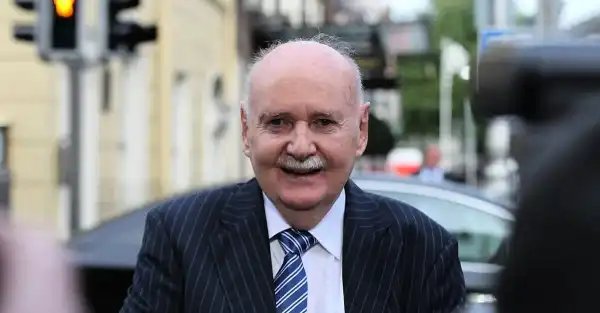
Collapsed lender Irish Nationwide Building Society operated like a commercial bank, taking a “very strong position in lending to speculative propositions”, a state-appointed director has claimed in a legal battle against the bank's former boss Michael Fingleton Snr.
State-appointed accountant Rory O'Ferrall told the High Court on Tuesday that a series of multimillion-pound loans were “highly unusual” in the wake of the economic crisis and “difficult to justify”, given that Mr Fingleton had assured the society's board in 2007 that the lender must be “risk averse” in the current financial climate.
A civil suit against the former CEO and managing director of INBS alleges that he negligently managed the building society and engaged in property “gambling” with wealthy individuals in an informal and speculative manner in the mid-2000s, leading to catastrophic losses.
Mr Fingleton (87), who is unable to give evidence due to ill health, began his career at the construction lender in 1971 and retired in 2009, having held the roles of both managing director and chief executive. At its peak in 2007, INBS reported assets of €16bn but was one of the high-profile victims of the 2008 financial crisis.
Liquidators at the Irish Banking Resolution Corporation (IBRC) have launched proceedings against Mr Fingleton, who denies allegations of negligence and mismanagement.
INBS's total losses are estimated at €6bn. However, IBRC is only seeking €290m in reimbursement for five specific loans that were allegedly approved by Mr Fingleton.
The court was told that Mr Fingleton allegedly “passed” top-ups and extensions to some customers' accounts without the knowledge of the company's board.
In the High Court today, Mr O'Ferrall contrasted the lending to the society with that of a “merchant” bank, which he said took on greater risks in lending but received a share of the expected profits from loans made to projects.
He noted that such an approach requires a different set of skills and experience in specialist industries and regions such as shipping, railways, real estate and development.
Mr O'Ferrall added that Irish Nationwide, under Mr Fingleton's leadership, had built “very strong lending positions” in property development on speculative deals in the UK and France.
Mr O'Ferrall said that around the time the loans were made between 2006 and 2009, “there was a general consensus among investors and the banking sector” that there would be a downturn in the property market by 2007 and that “all banks” would be in expected difficulty by 2008.
Mr O'Ferrall told Lyndon McCann, the chief judge representing the IBRC liquidators, that INBS no longer had a banking licence and so was not trading and that its only activity was settling various claims, including those from overseas.
Gerry McGinn, the former chief executive who took over after Mr Fingleton left, cited a loan for a luxury hotel project in a ski resort in southern France known as Ice Mountain, which the borrower valued at €32.85m with planning permission granted.
However, the project did not have planning permission and was then hit with a €565,000 tax bill by the French tax authorities. INBS paid the tax bill to borrower Cyril Dennis when he was asked to “stay in the game” on an asset that was never developed.
When Nama bought out the Ice Mountain loan in 2010, it was worth around €31 million. Nama paid just under €11 million for the loan, resulting in a €20 million loss to the taxpayer.
Mr McGinn noted that when INBS gets a rating for “a hotel in a foreign country and just getting a number on a page… it's pretty meaningless.”
Mr McGinn also added that the public interest appeared to be “secondary” to certain relationships between Mr Fingleton and the borrower.
Mr McGinn stressed that there are many different risks involved in borrowing
Sourse: breakingnews.ie






